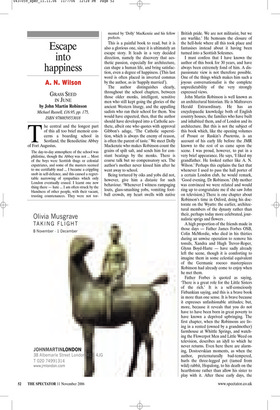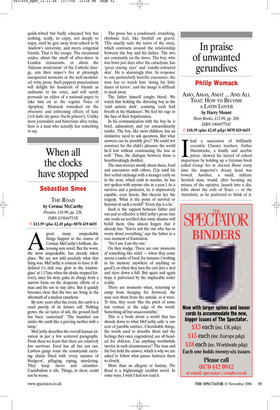Escape into happiness
A. N. Wilson
GRASS SEED IN JUNE by John Martin Robinson Michael Russell, £16.95, pp. 175, ISBN 9780859553018 The central and the longest part of this all too brief memoir concerns a boarding school in Scotland, the Benedictine Abbey of Fort Augustus.
The day-to-day atmosphere of the school was philistine, though the Abbey was not ... Most of the boys were Scottish thugs or colonial expatriates, and some of the masters seemed to me certifiably mad ... I became a crippling snob in self-defence, and this caused a regrettable narrowing of sympathies which only London eventually erased. I learnt one new thing there — hate ... I am often struck by the blandness of other people, with their vacant, trusting countenances. They were not tor mented by ‘Dolly’ MacKenzie and his fellow prefects.
This is a painful book to read, but it is also a glorious one, since it is ultimately an escape story. It leads in a very decided direction, namely the discovery that aesthetic passion, especially for architecture, can shape a human life, and bring satisfaction, even a degree of happiness. (This last word is often placed in inverted commas by the author, as in ‘happily married’).
The author distinguishes clearly, throughout the school chapters, between those older monks, intelligent, sensitive men who still kept going the glories of the ancient Western liturgy, and the appalling sadists who ran their school for them. You would have expected, then, that the author should have developed into a Catholic aesthete, albeit one who quotes with approval Gibbon’s adage, ‘The Catholic superstition, which is always the enemy of reason, is often the parent of taste.’ We meet Dolly Mackenzie who makes Robinson count the grains of spilt salt, and sends him for constant beatings by the monks. There is coarse talk but no compensatory sex. The author’s mother never kissed him after he went away to school.
Being tortured by oiks and yobs did not, however, give him a distaste for such behaviour. ‘Whenever I witness rampaging louts, glass-smashing yobs, vomiting football crowds, my heart swells with native British pride. We are not militarist, but we are warlike.’ He bemoans the closure of the hell-hole where all this took place and fantasises instead about it having been turned into a Scottish Solesmes.
I must confess that I have known the author of this book for 30 years, and have always been extremely fond of him. A dispassionate view is not therefore possible. One of the things which makes him such a joyous conversationalist is the complete unpredictability of the very strongly expressed views.
John Martin Robinson is well known as an architectural historian. He is Maltravers Herald Extraordinary. He has an encyclopaedic knowledge both of English country houses, the families who have built and inhabited them, and of London and its architecture. But this is not the subject of this book which, like the opening volumes of Proust or Ruskin’s Praeterita, is an account of his early life before the JMR known to the rest of us came upon the scene. I was proud, however, to put in a very brief appearance. He says, ‘I liked my grandfather. He looked rather like A. N. Wilson.’ Perhaps this explains the fact that whenever I used to pass the hall porter of a certain London club, he would remark, ‘Good evening, Dr Robinson.’ (My mother was convinced we were related and would ring up to congratulate me if she saw John on television.) There is one chapter about Robinson’s time in Oxford, doing his doctorate on the Wyatts: the earlier, architectural members of the dynasty rather than their, perhaps today more celebrated, journalistic sprigs and flowers .
A high proportion of the friends made in those days — Father James Forbes OSB, Colin McMordie, who died in his thirties during an unwise operation to remove his tonsils, Xandra and Hugh Trevor-Roper, Glynn Boyd-Harte — have sadly already left the scene, though it is comforting to imagine them in some celestial equivalent of the Germanic rococo masterpieces Robinson had already come to enjoy when he met them.
Father Forbes is quoted as saying, ‘There is a great role for the Little Sisters of the rich.’ It is a self-consciously Firbankian saying, and this is a brave book in more than one sense. It is brave because it expresses unfashionable attitudes; but, more, because it reveals that you do not have to have been born in great poverty to have known a deprived upbringing. The first chapter, when the Robinsons are living in a rented (owned by a grandmother) farmhouse at Whittle Springs, and watching the Flowerpot Men and Little Weed on television, describes an idyll to which he never returns. Even here there are alarming, Dostoevskian moments, as when the author, preternaturally bad-tempered, hurls the three-legged pet (tamed from wild) rabbit, Hopalong, to his death on the hearthstone rather than allow his sister to play with it. After these early days, the quick-witted but badly educated boy has nothing, really, to enjoy, not deeply to enjoy, until he gets away from school to St Andrew’s university, and meets congenial friends. That is the escape. The occasional asides, about the smell of after-shave in London restaurants, or about the ‘hideous modernism’ of the Catholic liturgy, aim their sniper’s fire at pleasingly unexpected moments in the well-modulated, witty prose. Such peppery punctuations will delight his hundreds of friends as authentic to his voice, and will surely persuade an editor of a national paper to take him on as the regular Voice of Apoplexy. Bismarck remarked on the obsessive and enlivening effects of hate (‘ich habe die ganze Nacht gehasst’). Unlike most journalists and historians alive today, here is a man who actually has something to say.



































































































 Previous page
Previous page